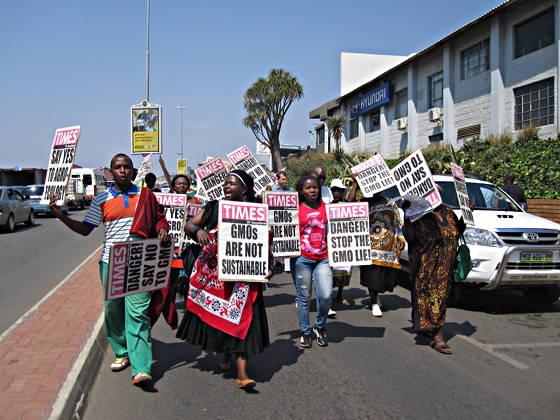Latest Resources

14 June 2018
Restrict, regulate and reduce corporate power in South Africa’s food system
I attended a dialogue on corporate ownership in South Africa in May, in Tshwane, hosted by Trade and Industrial Policy Strategies (TIPS). There was strong government representation at the dialogue, including from Treasury; Trade and Industry; Minerals and Energy; and Planning, Monitoring and Evaluation. Someone from the EU was also there. Corporate concentration is a […]

6 June 2018
Bayer opposes black economic empowerment in purchase of Monsanto
The Competition Tribunal announced the finalisation of the merger between Bayer and Monsanto in South Africa in May. Bayer had taken the original conditions imposed by the Competition Commission in 2017 to the Tribunal for reassessment. These included selling businesses to black economic empowerment (BEE) compliant companies. Bayer has claimed confidentiality on the conditions, making […]

4 June 2018
The debate on GMOs in Africa rages on, this time in Tanzania
A heated public debate on genetically modified organisms (GMOs) ensued during a seminar organised by MVIWATA – a network of smallholder farmers – in Morogoro, Tanzania. The meeting took place on 12 May 2018 and was attended by more than a hundred people, including parliamentarians and high-level government officials. The event, which was intended only […]

28 May 2018
Biosafety Indaba eSwatini: Unclear motives following approval to cultivate Bt cotton, despite dis...
The news that the Swaziland Environmental Authority (SEA) had authorised the importation and commercial release of Bt cotton seeds came as a huge shock to the African Centre for Biodiversity (ACB). It meant that ACB had to reconsider its earlier acceptance of an invitation by SEA to attend a National Biosafety Indaba on 22 May […]

12 March 2018
Insights into our food system: Why did catering indigenous local food at the National Seed Dialog...
On December 2017, the African Centre for Biodiversity (ACB) hosted a National Seed Dialogue and Celebration at Constitution Hill in Johannesburg. The event brought together farmers and civil society organisations from eight provinces, as well as from across the region, to celebrate the work that small-scale farmers do as custodians of seeds, and to share […]

22 January 2018
Art, Seed Sovereignty and Activism: Weaving New Stories
Preparing for the National Seed Dialogue and Celebration, hosted by the African Centre for Biodiversity, smallholder farmers, activists and government officials are crowded into the atrium of the Women’s Jail at Constitution Hill and a drum is beating. A performer, Simo Mpapa Majola, dressed in blankets, is praying and singing and imploring the audience. He […]

13 November 2017
Smallholder farmers score victory at international ‘Seed Treaty’ meeting
A landmark decision on the establishment of an Ad Hoc Technical Expert Group to realise farmers’ rights was recently taken by the seventh session of the Governing Body (GB7) of the International Treaty on Plant Genetic Resources for Food and Agriculture (ITPGRFA; also known as the ‘Seed Treaty’). There was stiff opposition from countries from […]

18 October 2017
The GMO crisis in Swaziland
Swaziland is under enormous pressure to introduce genetically modified organisms (GMOs) into the country’s farming system. This pressure is coming not only from Monsanto but also from farmers and some sections of the public who have been fed a great deal of misinformation and hype by the pro-biotech machinery. The farmers, acting on incomplete and […]

27 September 2017
Seed sovereignty for Peasant Farmers in Malawi blocked by emerging national seed policy
The government of Malawi is poised to adopt a draconian National Seed Policy that blocks peasant farmers’ opportunities to secure and strengthen farmer-managed seed systems (FMSS), and which would undermine farmers’ rights and the International Treaty on Plant Genetic Resources for Food and Agriculture, to which Malawi is a Party. An ad hoc stakeholder policy […]

19 September 2017
Erosion of farmers’ seed and agricultural systems in Tanzania
There are no simple answers when it comes to predicting the future of African food systems. Across the continent, the push to commercialise African agriculture to feed the growing and urbanising population, increase incomes, and reduce poverty is well known. However, this ‘solution’ is also heavily criticised for its ineffective, inappropriate and misdirected approach for […]
